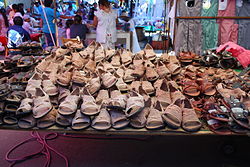Huarache (shoe)
This article needs additional citations for verification. (November 2010) |

Huaraches (derived from Warachi, in Purépecha, indigenous language IPA: [wa'ɾatʃe], singular huarache) are a type of Mexican sandal, Pre-Columbian in origin.
History[]

Pre-Columbian in origin, the sandals are believed related to the cactle or cactli, of Náhuatl origin. The name "Huarache" is derived from the Purépecha language term kwarachi, and directly translates into English as sandal.[1]
Early forms have been found in and traced to the countryside farming communities of Jalisco, Michoacan, Guanajuato and Yucatan. Originally of all-leather construction, the thong structure around the main foot is still traditionally made with hand-woven braided leather straps.[2]
Huaraches gained popularity in North America thanks to their adoption as part of the 1960s hippie lifestyle. By the end of the 20th century they were to be found all over North and South America.
Styles[]

Traditional huarache designs vary greatly, but are always very simple. Originally made of all-leather, later designs included woven string soles and occasionally thin wooden soles. Subsequently, more elaborate upper designs were created by saddlers and leather workers.
The modern huarache developed from the adoption in the 1930s of rubber soles developed from used rubber car-tires. Modern designs vary in style from a simplistic sandal to a more complex shoe, using both traditional leather as well as more modern synthetic materials.
Many shoes claim to be huaraches, but they are only considered traditional huaraches if they are handmade, and have a woven-leather form in the upper.[2]
Media[]
Huaraches are mentioned in the lyrics of the Beach Boys songs "Surfin' U.S.A." and "Noble Surfer", in the novel Ask the Dust, written by John Fante (Camilla Lopez's shoes), and also in the novel On the Road, written by Jack Kerouac. Skeeter Phelan wears a pair of the shoes, which her traditionalist Southern mother hates, in the Kathryn Stockett novel The Help. Doc Sportello, the detective from Thomas Pynchon's Inherent Vice, wears a pair of huaraches. He eventually loses one shoe and finishes the adventure using only the other one. In the Seinfeld episode "The Millennium" Elayne attempts to buy a pair of Huaraches from a disinterested shop owner.
See also[]
- Ho Chi Minh sandals, Vietnamese footwear made from old tires
- Huarache (running shoe)
- Waraji
- Xero Shoes
References[]
- ^ "Free Translation and Professional Translation Services from SDL". Freetranslation.com. 2011-01-20. Retrieved 2012-01-19.
- ^ a b "Huaraches.com | Information > Huarache History". Web.archive.org. 2010-12-07. Archived from the original on December 7, 2010. Retrieved 2012-01-19.
- Sandals
- Shoes
- Folk footwear
- Mexican clothing
- Clothing stubs